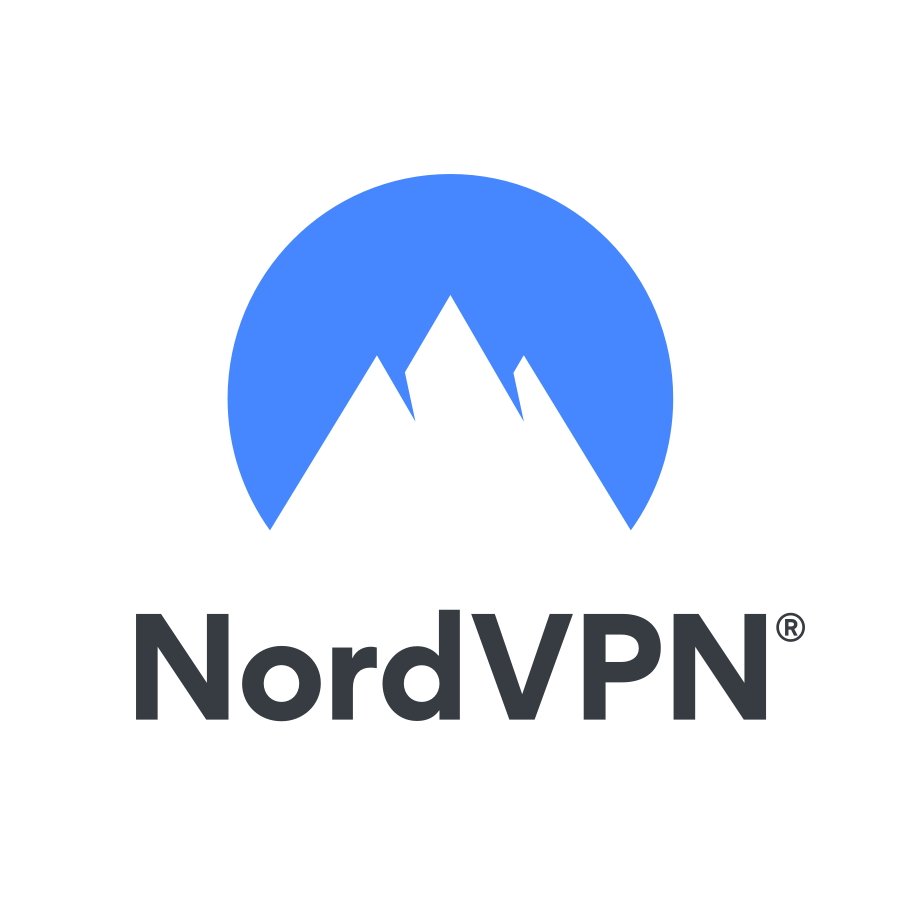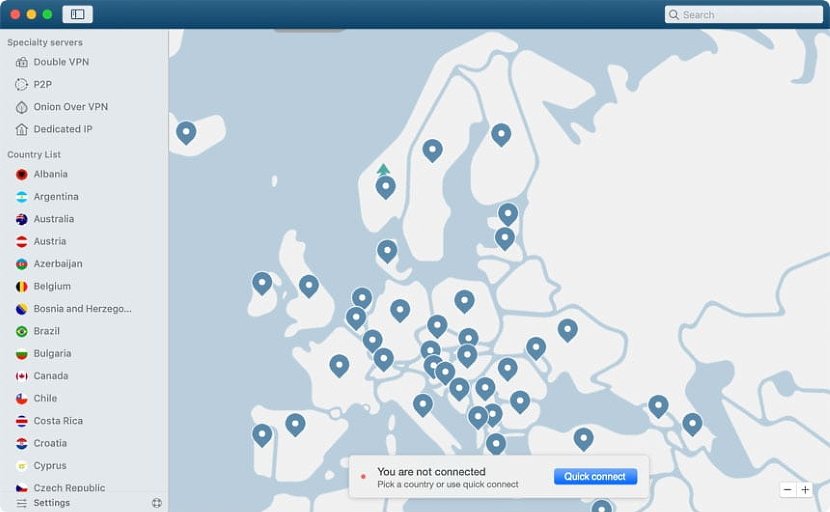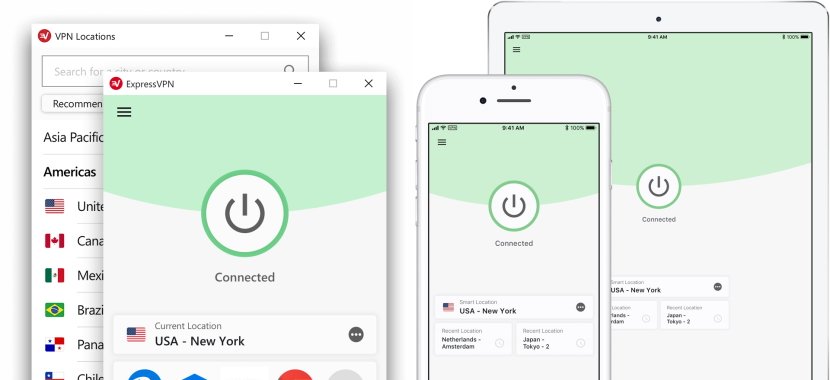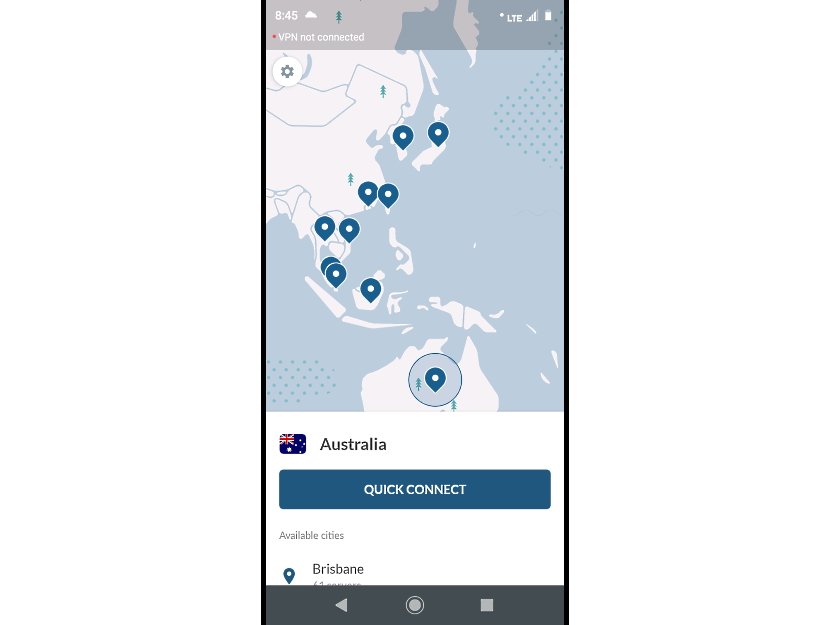Is ExpressVPN or NordVPN the better choice for you?
ExpressVPN
More apps
Pros
- Unlimited bandwidth
- Six VPN protocols supported
- Software for ten OSes, two browsers, 11 routers
- P2P support
- Split tunneling
- Virtual servers
Cons
- No dedicated IP
- Fewer servers than NordVPN
- More expensive
ExpressVPN has apps for several OSes and device platforms, which include ones for Android TV, Nook HD and several Amazon personal devices. European countries are where ExpressVPN's 3,000+ servers are mostly located, with Asian countries being second.
NordVPN
More servers
Pros
- Unlimited bandwidth
- Two VPN protocols supported
- Apps/extensions for six OSes, two browsers
- P2P support
- Double VPN
- Better value
Cons
- Split-tunneling through browser extensions only
- Less apps than ExpressVPN
Most of NordVPN's 5,500+ servers are in Europe, followed by the Americas. NordVPN provides apps for several OS platforms and web browsers, and features extras such as a double VPN and access to the Onion network and servers configured for P2P file sharing.
What's a VPN?
If you need to maintain your privacy and security on the internet a bit more, look into using a Virtual Private Network (VPN). It's a network that moves your data from your PC to a specific server, where it is encrypted before going out into the internet.
When considering a VPN service to use, one factor to consider is how many servers it has throughout the world. Also, you should look for apps the company may provide that can help you to easily access its network from your PC or mobile device, along with any extra security measures (such as unique server features, functions in its apps, and company policies).
NordVPN is regarded as a top choice, although ExpressVPN is another contender. Which comes out on top? To help you decide, we compare their differences and similarities.
| ExpressVPN | NordVPN | |
|---|---|---|
| Bandwidth limit | Unlimited | Unlimited |
| Number of simultaneous device connections | 5 | 6 |
| Keeps logs of your activity? | No | No |
| Number of servers | 3,000+ | 5,200+ |
| Number of countries w/ servers | 94 | 59 |
| Number of VPN protocols supported. | 6 | 2 |
| Software | Amazon Fire, Android, Android TV, Chrome, Firefox, iOS, Linux, macOS, Nook HD, routers, Windows | Android, Android TV, Chrome, Firefox, iOS, Linux, macOS, Windows |
| Main office location | British Virgin Islands | Panama City |
| Price w/ prepay for one year | From $6.67/mo. | From $3.49/mo. |
ExpressVPN vs. NordVPN: Log keeping
It's strongly advised that you only sign up for a VPN that says it doesn't retain logs. Otherwise, an outside party could possibly get hold of those logs. With this in mind, you should also note the country where the VPN company's offices are located. The law enforcement of many governments may not respect people's privacy online, to put it gently.
Fortunately, both NordVPN and ExpressVPN say they do not keep logs. Here is what ExpressVPN states on its site about its policy regarding this matter:
ExpressVPN does not see or record which websites you visit. We never log the destination or contents of your traffic, and we run our own private, zero-knowledge DNS on every VPN server for added privacy and anonymity. ExpressVPN never logs connection timestamps, session duration, your source IP address, or the ExpressVPN IP address that your computer assumes when connected to the VPN.
ExpressVPN is based in the British Virgin Islands. Presently, this country has no formal laws that regulate data protection.
This is NordVPN's no-logging policy:
We do not track the time or duration of any online session, and neither do we keep logs of IP addresses or servers used, websites visited or files downloaded. In other words, none of your private and secure data is logged and gathered at any time.
NordVPN's office is based in Panama, which has no law requiring a company like it to retain data.
Between the two companies, both appear to be on equal level when it comes to its no-logging rule.
ExpressVPN vs. NordVPN: Servers and locations
You should typically consider a VPN service that has a lot of servers. This choice increases the likelihood that you can get a solid and fast connection. Also, if you want to connect to servers in specific countries, look for how many countries that the VPN has servers in. This makes your PC look like it's located in a country that's not the one where you're actually located.
ExpressVPN has more than 3,000 servers in over 94 countries. Most are in Europe, followed by Asia. Some are virtual servers: If you connect to a server located in a country where the internet is not fast or secure enough, your data will be routed first to a server in another, nearby country (where the speed and security of the internet are better) before it arrives at the slower or less secure server. ExpressVN has 41 so-called virtual servers.
NordVPN has over 5.500 servers spread over 59 countries. Most are in Europe. Countries in North America, Central America, and South American altogether house the second most number of NordVPN servers. Some of its servers feature double VPN or are specifically configured for P2P file sharing. If you need a dedicated IP address while using NordVPN, you can pay $70 for one. You can choose from one that's located in France, Germany, the Netherlands, U.K. or U.S.
In terms of pure numbers, NordVPN wins with nearly double the number of servers over ExpressVPN's network.
ExpressVPN vs. NordVPN: Performance
Before you pay for a VPN, make sure the company has a money-back guarantee. This can let you try out a service to see if you will be happy with it long-term, but there's another reason why: Generally speaking, the performance of any VPN service depends on where you are in the world, where its server that you connect to is located, and how much traffic there is running through that server at the time you connect to it.
We already pre-select VPNs that appear to have similar network performance in order to focus on their other features to determine the best deal. We tested NordVPN and ExpressVPN at various times throughout the day, and the performance of each was comparable to the other.
NordVPN vs. ExpressVPN: Number of devices
You may have several devices that you'd like to connect to a VPN: For example, you have a PC, smart TV, and home security network. Many VPN services let you keep more than one device connected to their networks at the same time.
You can connect up to five of your devices to ExpressVPN's network simultaneously. NordVPN wins on this factor but by just a hair, with up to six devices at once. (Keep in mind that a router counts as one device. Thus, if you connect your router to a VPN, and then your devices connect to this router, the internet traffic running from each device will go through the VPN.) The difference here between ExpressVPN and NordVPN is negligible.
NordVPN vs. ExpressVPN: Bandwidth limits
Many cheap VPNs or free VPN services have bandwidth limits. This is separate from your bandwidth usage on your regular ISP. In such a case, you're allowed a certain amount of bandwidth that travels between your PC or other device and the VPN's servers.
The good news is that neither ExpressVPN or NordVPN have bandwidth limits as you experience the internet through their networks.
NordVPN vs. ExpressVPN: Apps
A capable and worthy VPN provider has apps that help you connect your PC, smartphone, or other device to its network and maintain your online security conveniently.
ExpressVPN has apps for all the major OSes — Android, iOS, Linux, macOS and Windows. The company also provides apps that are specifically for Amazon Kindle and Nook HD e-readers, and Amazon Fire tablets. And it has apps for smart TVs that run Android TV, and for the Amazon streaming devices (Fire Stick, Fire TV, Fire TV Cube). You can even use ExpressVPN through a browser extension for Chrome or Firefox, and firmware customized for use on the ExpressVPN network that can be installed on 11 router models by ASUS, Linksys and Netgear.
NordVPN has apps for Android, Android TV, iOS, Linux, macOS and Windows, and extensions for Chrome and Firefox.
ExpressVPN wins this category for supporting the most OSes and platforms with apps.
NordVPN vs. ExpressVPN: Features
ExpressVPN's apps include a "kill switch" that will block the internet connection to your device if the VPN goes down for some reason. This helps to ensure that your private information, such as your actual IP address, doesn't become exposed. The Android, macOS and Windows apps, and browser extensions feature split tunneling, which enables you to choose which apps or devices should access the internet through the VPN while letting the internet traffic of other apps or devices to go normally through your internet service provider.
Like ExpressVPN, NordVPN's apps can also cut off access to your device if its connection to the NordVPN network drops. They can also block ads and malicious sites. Their other features include accessing the Onion network and servers optimized for P2P file sharing, double VPN, and quick connecting to video streaming services that are region-blocked. Split tunneling is supported through the Chrome and Firefox extensions. Overall, it just has more features than ExpressVPN.
ExpressVPN vs. NordVPN: P2P and Onion
Most VPNs generally support the use of P2P on their networks, but ExpressVPN doesn't list servers that are set up specifically for this purpose. It also doesn't have servers to handle traffic through the Onion network. You'll have to use The Onion Router ("Tor") browser, which is how you usually access the internet through this secure network.
NordVPN lets you use P2P through certain servers on its network. If you connect to a P2P server using the NordVPN app, you don't need to choose a server because your connection will be automatically secured for P2P. It also has specific servers that route your traffic through the Onion network, so you don't need to use the Tor browser.
ExpressVPN vs. NordVPN: Pricing and plans
Like most providers, there are plenty of VPN deals to choose from with ExpressVPN and NordVPN. You can choose from three plans with ExpressVPN. Pay in advance for one year of service and this breaks down to $6.67 per month and right now you get an extra three months of service for free. A six-month plan makes the per month amount $9.99. And if you prefer to go month-to-month, the cost is $12.95. All plans have a 30-day money-back guarantee if you are not satisfied.
NordVPN sells four plans with a 30-day money-back guarantee. A three-year plan is the best deal, breaking down to $3.49 per month. The two-year plan is $4.99 per month. The one-year plan is $6.99 per month. Paying month-to-month is $11.95.
Between the two, NordVPN offers the best prices and most plan choices.
Which VPN should you use?
If you have an e-reader, such as a Kindle or Nook HD, or Amazon streaming device, take a look at ExpressVPN for its apps that support these platforms. Most of ExpressVPN's apps support split tunneling.
Looking for the widest security tools in a VPN? It's hard to beat NordVPN. It includes double VPN, Onion network access, and servers that are configured for P2P file sharing. On top of these, it has the most servers throughout the world and lowest plan prices.
ExpressVPN
More apps
Broad OS and device support
European countries are where ExpressVPN's 3,000+ servers are mostly located, with Asian countries being second. ExpressVPN has apps for several OSes and device platforms. These include ones for Android TV, Nook HD and several Amazon personal devices.
NordVPN
More servers
Lots of servers and security tools
Most of NordVPN's 5,500+ servers are in Europe, followed by the Americas. NordVPN provides apps for several OS platforms and web browsers, and feature extras such as double VPN, and access to the Onion network and servers configured for P2P file sharing.
from Android Central - Android Forums, News, Reviews, Help and Android Wallpapers https://ift.tt/3buCjbR
via IFTTT







Aucun commentaire: